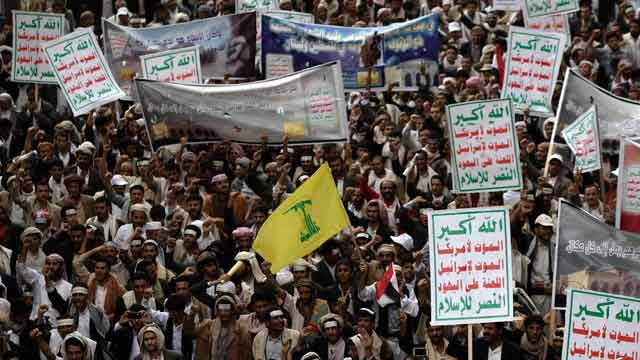The State Department on Tuesday ordered most embassy personnel out of Yemen and urged all U.S. citizens currently in that country to leave over the Al Qaeda threat that triggered the shutdown of 19 American diplomatic posts this week.
The U.S. Air Force already has flown State Department personnel out of the capital of Sanaa as part of the broad evacuation effort. According to a senior U.S. official, fewer than 90 embassy personnel were flown out on a military aircraft.
"The U.S. Department of Defense continues to have personnel on the ground in Yemen to support the U.S. State Department and monitor the security situation," Pentagon spokesman George Little said.
The rapid-fire developments on Tuesday came as two drone strikes killed four suspected Al Qaeda militants in the Yemeni province of Mareb, an Al Qaeda stronghold. The sources said that one strike hit a car with four militants inside, while the other hit a militant hideout. There have been six drone strikes in Yemen in the past six days, Fox News has learned.
Daily politics news delivered to your inbox: sign up for our newsletter
The Obama administration has offered few specifics on the nature of the threat, but repeatedly has said it appears to originate in -- and possibly be directed toward -- the Arabian Peninsula, which is where Yemen is located and which houses Al Qaeda's most notorious affiliate.
The department said in a travel warning that it had ordered the staff departures "due to the continued potential for terrorist attacks" and added that all Americans in Yemen should leave immediately because of an "extremely high" security threat level.
"As staff levels at the Embassy are restricted, our ability to assist U.S. citizens in an emergency and provide routine consular services remains limited and may be further constrained by the fluid security situation," the State Department travel warning said in part.
Less than two hours after the State Department issued their warning, the British government said it had "temporarily withdrawn" all staff from its embassy in Yemen due to the terror threat.
Sources tell Fox News that Al Qaeda could be planning attacks on other foreign offices, infrastructure, and organizations in Yemen in addition to the American embassy. A Yemeni government official had said Monday that the embassy itself was "heavily fortified," adding: "You would need a small army to penetrate the post." In an official statement, the Yemeni government said it was taking "all necessary precautions to secure diplomatic facilities, vital installations and strategic assets."
The Associated Press reported that Yemeni officials were also focusing on the strategic Bab al-Mandeb straits at the entrance to the Red Sea as a possible target of an attack. Officials cited intelligence that Al Qaeda could be targeting foreign or Yemeni interests at the vital Red Sea corridor, which is a main thoroughfare for international shipping but also a crossing point of for smuggled weapons and illegal immigrants between east Africa and Yemen.
The government of Yemen has released a list of 25 terrorists it deems most likely to carry out "operations" in Saana. At the top of the list is Ibrahim al-Rubaish, a Saudi who is described as a spiritual and strategic leader of Al Qaeda in the Arabian Peninsula. Al-Rubaish was at one point held at the detention facility at Guantanamo Bay in Cuba, but was released in 2006.
The number-two person on the official list is Ibrahim al-Asiri, described as the group's master bomb maker. He has been described as the explosives expert behind the botched Christmas Day 2009 bombing of an airliner bound for Detroit and the explosives-laden parcels intercepted aboard cargo flights a year later.
The Yemeni statement said security forces will pay $23,000 to anyone who comes forward with information that leads to the arrests of any of the wanted men.
Fox News has also confirmed that a Yemeni intelligence official was fatally shot just south of Saana on Sunday. The official's death is believed to be related to the latest terror scare.
On Monday, a U.S. intelligence source told Fox News that the terror threat that led to the closure of nearly two dozen U.S. embassies and consulates resulted from intercepted communications between the head of Al Qaeda and the leader of its Arabian Peninsula affiliate.
The confirmation shows just how high the alleged threat goes in the terror network and is the most specific detail to emerge over the nature and origin of the threat. The source said the communications were intercepted between Ayman al-Zawahiri -- who is Usama bin Laden's successor -- and Nasir al-Wuhayshi, head of Al Qaeda in the Arabian Peninsula.
Asked about the claim, officials with the CIA and Office of the Director of National Intelligence would not confirm the details of any such intercepted communications.
Al Qaeda in the Arabian Peninsula has been widely considered Al Qaeda's most dangerous affiliate for several years.
Earlier Monday, officials with the White House and State Department declined to provide further specifics about the nature of the threat. White House Press Secretary Jay Carney would say only that the threat potentially goes "beyond" the Arabian Peninsula.
Some analysts pointed to the lack of specificity in questioning whether the threat was being blown out of proportion.
Anthony Shaffer, a former military intelligence officer who now works with the Center for Advanced Defense Studies, said this might just be "Al Qaeda pushing our buttons" to see how the U.S. responds.
State Department spokeswoman Marie Harf pushed back when asked at Monday's press briefing about the possibility that the intelligence was a ruse.
"Without speaking to the specific stream of reporting, without getting into the intelligence on this threat, our folks that look at these things and analyze them always take a very hard look at them to make sure that they're credible ... to look at them to see if they're ... possibly something to throw us off," Harf said.
Fox News' Greg Palkot and Jennifer Griffin and FoxNews.com's Judson Berger and The Associated Press contributed to this report.





